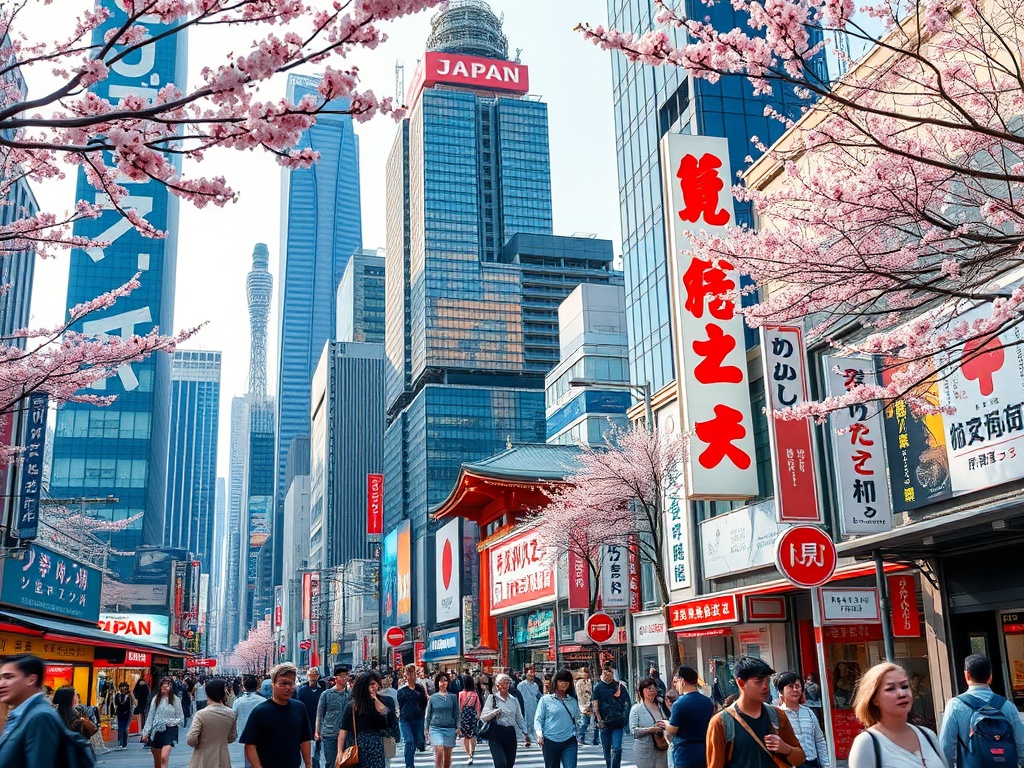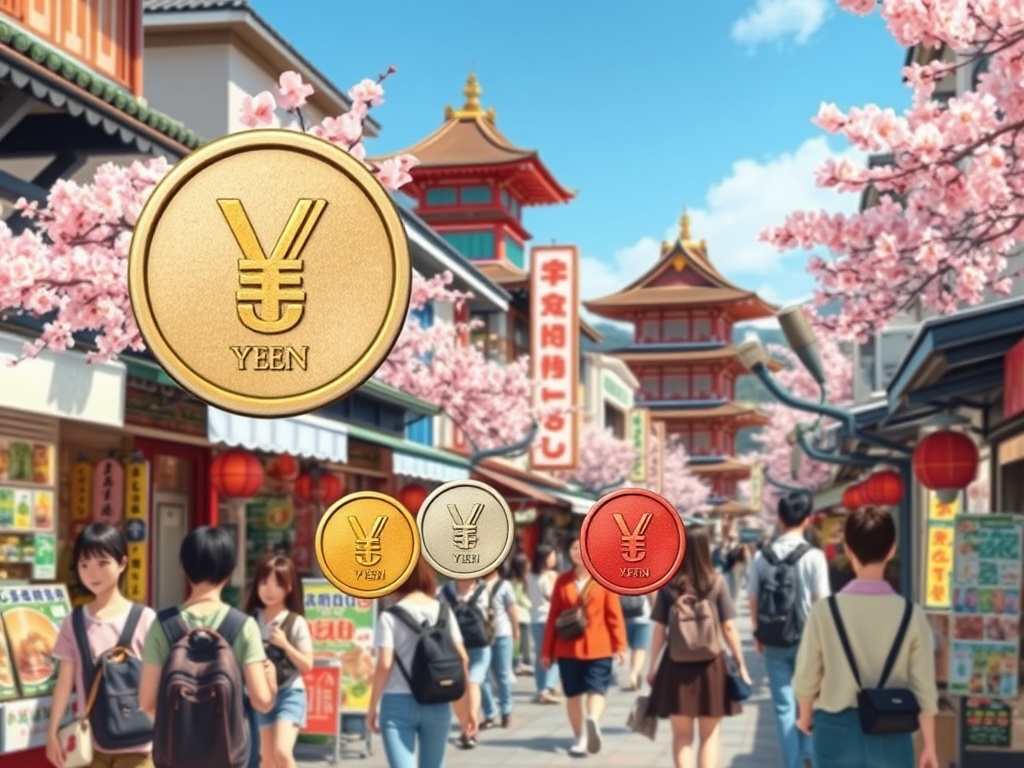The Land of the Rising Yen: Currency Trends Impacting Tourism
Win a Free Trip to Japan!
Experience cherry blossoms and ancient temples
Japan, a country renowned for its blend of ancient traditions and cutting-edge technology, is also a significant player in the global economy. As we navigate through 2024, the country’s currency, the yen, is becoming a focal point for travelers worldwide. The fluctuations in its value are not just numbers on a stock ticker; they hold the power to enhance or hinder tourism experiences. Let’s delve into how these trends are shaping the travel landscape in Japan.
The yen’s value against other currencies can directly impact the cost of traveling in Japan. When the yen strengthens, tourists might find their hotel bookings, dining experiences, and shopping sprees a bit pricier than anticipated. Conversely, a weaker yen makes Japan more affordable and attractive to international travelers, providing more bang for your buck.
Understanding these dynamics can help tourists plan more effectively. Awareness of currency trends allows savvy travelers to time their vacations to coincide with more favorable exchange rates, maximizing their enjoyment and financial efficiency.
Whether you’re an experienced globetrotter or a first-time visitor to Japan, navigating a shifting currency landscape can be daunting. Here are some expert tips to help make your journey as smooth as possible:
- Monitor Exchange Rates: Keep an eye on financial news and currency conversion apps to stay informed of any significant changes.
- Consider Prepaid Travel Cards: These can lock in exchange rates ahead of time, protecting you from sudden shifts.
- Budget for Flexibility: Allocate a little extra in your travel budget to accommodate potential currency fluctuations.
- Local Deals and Discounts: Take advantage of local promotions, which may offer additional savings regardless of currency strength.
By employing these strategies, tourists can ensure that currency fluctuations have minimal impact on their travel enjoyment, allowing them to focus on discovering the wonders that Japan has to offer.
Economic Tsunami or Tidal Wave? Japan’s Market Waves for Travelers
As 2024 unfolds, the economic currents in Japan are stirring with both potential challenges and opportunities for travelers. The landscape is akin to a dynamic ocean, where the tides of the yen’s value and market forces create an intricate dance that can make or break a traveler’s budget. For those planning a journey to this fascinating country, understanding these economic waves can be as crucial as packing the right clothes.
Japan’s economy, often referred to as a ‘keiretsu of innovation and tradition’, is showing signs of both resilience and volatility. The current economic climate is shaped by several factors, including global trade dynamics and domestic policy shifts. As the yen oscillates, it creates a ripple effect that impacts not just the local economy but also the travel experiences. For instance, when the economy faces a ‘tidal wave’ of growth, the yen might strengthen, leading to higher costs for travelers. Conversely, during periods of economic slowdown, a weaker yen could mimic an ‘economic tsunami’ that offers travelers a more budget-friendly experience.
For tourism enthusiasts, these economic trends are not mere statistics; they are the backdrop against which adventures unfold. The interplay between Japan’s economic strategies and global market conditions can influence everything from the price of a sushi dinner to the cost of a night in a traditional ryokan. Understanding these dynamics allows travelers to strategize their journeys, ensuring they can savor the full spectrum of experiences Japan has to offer without being blindsided by unexpected expenses.
Travelers can benefit from staying informed about Japan’s economic indicators, such as GDP growth rates and inflation levels, which provide insights into potential cost changes. By becoming attuned to these market signals, tourists can better time their visits and budget accordingly. Moreover, engaging with local experts or travel advisors who understand the nuances of Japan’s economic landscape can offer a deeper understanding of how to best navigate these waters.
Another layer to consider is the impact of Japan’s monetary policies. The Bank of Japan’s decisions on interest rates can affect currency valuations, thereby altering the cost dynamics for travelers. Keeping a pulse on these developments enables tourists to make informed decisions, ensuring their yen stretches further. Ultimately, the goal is to ride the economic waves with finesse, turning potential challenges into rewarding travel experiences.
Despite the ebb and flow of economic conditions, Japan remains a land of endless possibilities for exploration. Whether it’s the serene beauty of a Kyoto temple or the technological marvels of Tokyo, the country’s allure is timeless. Embracing local culture and economies through sustainable tourism practices not only enriches the travel experience but also supports Japan’s economic vitality. As travelers, understanding and adapting to these market waves ensures that the journey is as enriching as the destination itself.
From Bullet Trains to Blockchain: Innovations Shaping Japan’s Travel Economy
As we forge into 2024, Japan stands at the crossroads of tradition and technology, where innovative advancements are redefining the travel economy. Known for its pioneering spirit, Japan is leveraging both its historical assets and modern technological prowess to create a travel experience unlike any other. The fusion of cutting-edge innovations with the country’s rich cultural tapestry offers travelers a unique opportunity to explore Japan through a new lens.
One cannot discuss Japan without mentioning the iconic bullet trains, or shinkansen, which have long been a symbol of the country’s commitment to speed and efficiency. These marvels of engineering are now being complemented by advancements in blockchain technology, which promise to revolutionize the way travelers experience Japan. Blockchain, with its potential to streamline transactions and enhance security, is being deployed in various sectors, from ticketing and accommodations to dining and retail. This integration is poised to offer tourists a seamless and secure travel experience, reducing friction and enhancing convenience.
The shinkansen has been a cornerstone of Japan’s travel infrastructure, providing fast, reliable, and environmentally friendly transportation across the country. In 2024, these high-speed trains are undergoing their own renaissance, with the introduction of new technologies aimed at further improving efficiency and passenger comfort. The integration of AI and IoT within the railway systems allows for real-time data collection and analysis, optimizing routes and schedules for peak performance. This not only reduces travel times but also enhances the overall travel experience, making exploring Japan more accessible than ever before.
As blockchain technology gains traction, its application in Japan’s travel economy is becoming increasingly significant. By offering a decentralized and transparent system, blockchain ensures that transactions are secure and verifiable, providing peace of mind to travelers. Whether it’s purchasing a train ticket or booking a hotel, blockchain can streamline these processes, eliminating the need for intermediaries and reducing costs. This technological leap forward not only benefits the travel industry but also empowers tourists to navigate the complexities of travel with greater ease.
The convergence of these innovations highlights Japan’s ability to adapt and thrive in a rapidly changing world. For travelers, this means an opportunity to experience a country that is both steeped in history and at the forefront of technology. As Japan continues to embrace these advancements, it remains a compelling destination for those seeking a travel experience that is both enriching and exhilarating.
Cultural Riches or Economic Puzzles? How Japan’s Economy Influences Your Journey
Japan’s economy is like a finely woven kimono, intricate and full of surprises, where each thread tells a story of tradition and modernity. For travelers, understanding this complex tapestry can transform a journey from a mere visit to an immersive experience. As Japan continues to navigate the choppy waters of global economics in 2024, its economic landscape offers both challenges and opportunities for those eager to explore its wonders.
Traveling to Japan is not just about witnessing breathtaking landscapes or indulging in culinary delights; it’s also about navigating a dynamic economic environment. The fluctuations in Japan’s economy can influence various aspects of travel, from accommodation costs to the availability of cultural experiences. Understanding these economic puzzles can help travelers make savvy decisions, ensuring their journey is both enjoyable and economically sound.
- Key Economic Factors Affecting Travel:
- Consumer Prices: Monitor changes in local pricing to budget effectively for dining and shopping.
- Transportation Costs: Be aware of potential price adjustments in public transport and domestic flights.
- Tourist Attractions: Keep an eye on entry fees and availability of discounted passes.
While navigating Japan’s economic nuances, travelers should not lose sight of the cultural gems that await discovery. Japan offers a diverse array of experiences that cater to all budgets, allowing visitors to immerse themselves in its rich heritage without breaking the bank.
Consider participating in traditional tea ceremonies, exploring lesser-known temples, or joining local festivals. These activities often provide more authentic and cost-effective insights into Japanese culture compared to more commercialized attractions.
Remember, the key to a fulfilling journey lies in striking a balance between economic considerations and cultural explorations. With thoughtful planning, travelers can unlock the full potential of their Japanese adventure, ensuring that every moment is as enriching as it is memorable.
The Cherry Blossom Economy: Seasonal Tourism and Economic Shifts
Every spring, Japan transforms into a pastel wonderland as cherry blossoms, or sakura, blanket the landscape. This breathtaking spectacle draws millions of tourists, earning a significant slice of the country’s tourism revenue and contributing to what is known as the ‘Cherry Blossom Economy.’ However, this seasonal influx isn’t just about pretty flowers—it’s a complex economic phenomenon with rippling effects on various sectors.
The sakura season is a vibrant period for Japan’s economy, with the tourism industry witnessing a surge in activity. The influx of international and domestic travelers propels demand for accommodations, dining, transport, and cultural experiences. This seasonal boom not only boosts local businesses but also influences broader economic indicators, reflecting in GDP growth and employment rates during the peak months of March and April.
Here’s a look at how the cherry blossom season economically benefits Japan:
- Increased Tourism Revenue: The sakura season attracts millions of tourists, augmenting tourism earnings significantly.
- Boost in Retail Sales: Souvenir shops, food stalls, and local markets see increased sales as visitors indulge in local specialties and mementos.
- Seasonal Employment Opportunities: To accommodate the tourist surge, temporary jobs in hospitality and services often see a spike, providing additional income opportunities for locals.
While the cherry blossom season is a boon, it also presents challenges. The sudden surge in visitors can strain infrastructure, leading to overcrowding in popular spots and fluctuating service quality. Moreover, the unpredictability of bloom timings due to climate change can impact travel plans and economic forecasts, requiring adaptive strategies from businesses and policymakers.
For those keen on experiencing the sakura season, the key lies in planning and timing. Travelers can capitalize on early bookings and explore less-crowded regions to enjoy the blooms while benefiting the local economies. Understanding these dynamics not only enhances the travel experience but also promotes a sustainable approach to tourism.
Gastronomy and GDP: How Japan’s Culinary Scene Entices Global Nomads
In 2024, amid Japan’s economic landscape, gastronomy emerges as a pivotal cultural and financial force, drawing food lovers from around the globe. The Japanese culinary scene, renowned for its exquisite flavors and meticulous artistry, is more than just a feast for the senses; it’s a significant contributor to the nation’s GDP. As travelers flock to Japan to savor authentic sushi, ramen, and more, they inadvertently fuel an economic engine that supports both local businesses and the broader economy.
Japan’s culinary allure is a magnet for global nomads, with each dish offering a taste of its rich cultural heritage. From bustling street markets to Michelin-starred restaurants, the food sector plays a crucial role in Japan’s economic vitality. Gastronomy tourism not only boosts the restaurant industry but also stimulates related sectors such as agriculture, fisheries, and even travel services. This interconnected ecosystem ensures that every meal enjoyed contributes to a larger economic narrative, where every bite is an investment in Japan’s prosperity.
The impact of culinary tourism extends beyond the dining table. As visitors indulge in authentic Japanese cuisine, they often explore local wineries, sake breweries, and tea plantations, further enhancing their cultural experience and economic contribution. This symbiotic relationship between gastronomy and tourism fosters a sustainable economic model, where local producers thrive and the culinary arts flourish, ensuring a vibrant and robust tourism sector.
Japan’s gastronomic scene is not static; it continuously evolves, blending traditional techniques with modern innovations. This dynamic evolution attracts a new wave of culinary adventurers seeking unique dining experiences. Innovative concepts like robotic sushi chefs and AI-driven menu personalization are reshaping how food is prepared and consumed, further positioning Japan as a leader in culinary innovation.
Such advancements not only enhance the dining experience but also create new economic opportunities. Restaurants and cafes that embrace these technologies often see increased patronage and improved efficiency, leading to higher profitability. As Japan continues to explore the fusion of gastronomy and technology, it opens new avenues for international partnerships and investment, reinforcing its status as a culinary powerhouse.



